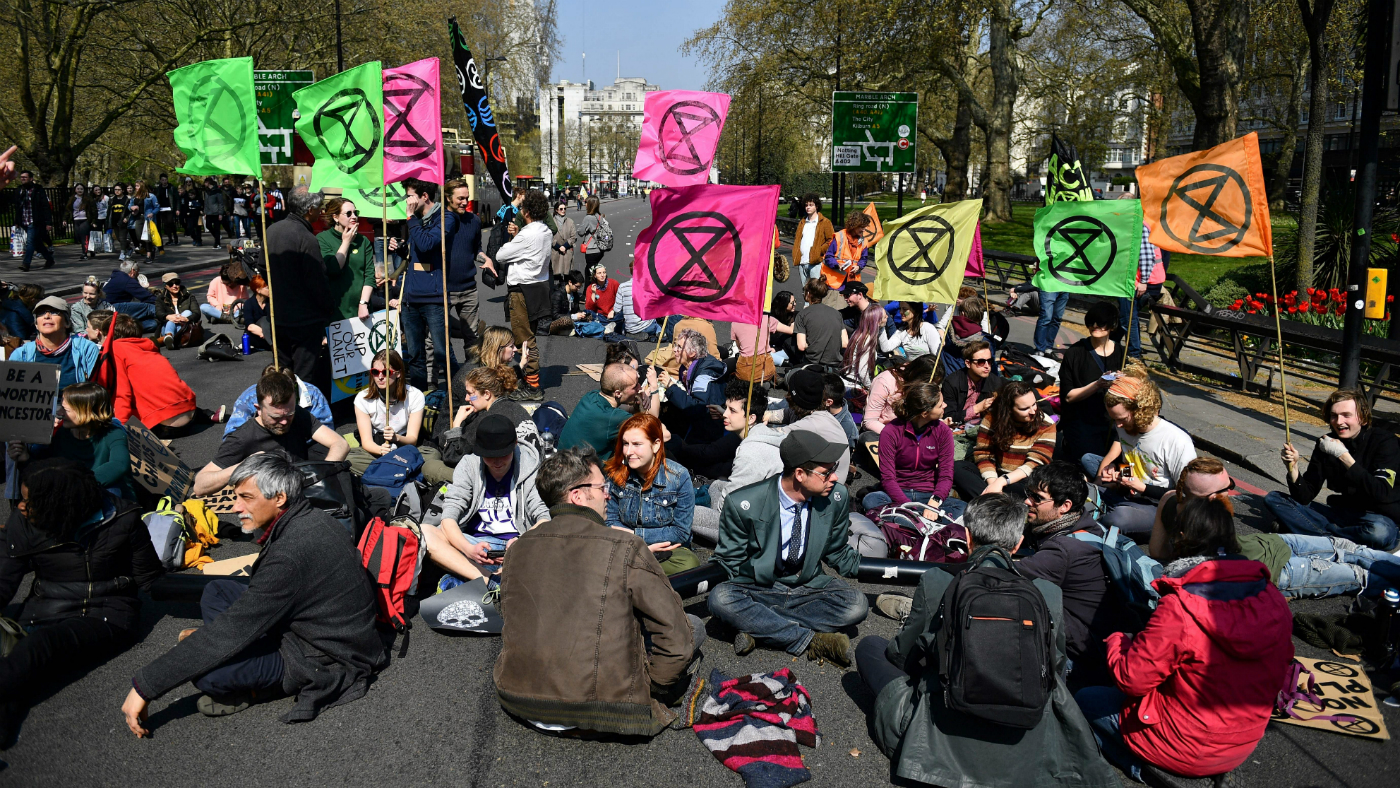Extinction Rebellion: arrests ahead of fresh protests
Police raid London building after shifting to more proactive strategy

A free daily email with the biggest news stories of the day – and the best features from TheWeek.com
You are now subscribed
Your newsletter sign-up was successful
Police in London have made ten arrests ahead of a fortnight of fresh disruption by environmental activist group Extinction Rebellion.
Days after police warned they would be more pro-active and assertive in dealings with the group, officers from the Metropolitan police’s territorial support group raided a building in south London, where Extinction Rebellion activists were storing equipment to use in this week’s protests.
The confiscated equipment included portable toilets, kitchen equipment, gazebos, tents, cooking urns, thermos flasks, food, waterproofs, and hot water bottles. Seven women and three men were arrested on suspicion of conspiracy to cause public nuisance.
The Week
Escape your echo chamber. Get the facts behind the news, plus analysis from multiple perspectives.

Sign up for The Week's Free Newsletters
From our morning news briefing to a weekly Good News Newsletter, get the best of The Week delivered directly to your inbox.
From our morning news briefing to a weekly Good News Newsletter, get the best of The Week delivered directly to your inbox.
Richard Ecclestone, a former police officer who has joined the environmental campaign group, said police tactics are “very questionable” and “arguably infringing on our rights to peaceful protest, and indeed our efforts to preserve people’s right to life that is currently being jeopardised by the government”.
Activists are set to descend on Westminster this morning in a bid to “shut down” the heart of government for a fortnight. Extinction Rebellion said its members are planning to blockade “every single road” into the district.
Asked on Sky News whether the protests could disrupt hospitals, activist Savannah Lovelock said that they were “really sorry… but we are running out of time”.
A splinter group called Animal Rebellion is also planning to “occupy” Smithfield market this week. The vegan group hopes to convince people to adopt a plant-based diet.
A free daily email with the biggest news stories of the day – and the best features from TheWeek.com
“We're disrupting the idea that Smithfield must always be a place of death and environmental destruction. Because we know that the animal farming and fishing industries are massive contributors to the climate crisis,” said a spokesman.
For a round-up of the most important stories from around the world - and a concise, refreshing and balanced take on the week’s news agenda - try The Week magazine. Get your first six issues for £6
-
 Health insurance: Premiums soar as ACA subsidies end
Health insurance: Premiums soar as ACA subsidies endFeature 1.4 million people have dropped coverage
-
 Anthropic: AI triggers the ‘SaaSpocalypse’
Anthropic: AI triggers the ‘SaaSpocalypse’Feature A grim reaper for software services?
-
 NIH director Bhattacharya tapped as acting CDC head
NIH director Bhattacharya tapped as acting CDC headSpeed Read Jay Bhattacharya, a critic of the CDC’s Covid-19 response, will now lead the Centers for Disease Control and Prevention
-
 The plan to wall off the ‘Doomsday’ glacier
The plan to wall off the ‘Doomsday’ glacierUnder the Radar Massive barrier could ‘slow the rate of ice loss’ from Thwaites Glacier, whose total collapse would have devastating consequences
-
 Can the UK take any more rain?
Can the UK take any more rain?Today’s Big Question An Atlantic jet stream is ‘stuck’ over British skies, leading to ‘biblical’ downpours and more than 40 consecutive days of rain in some areas
-
 As temperatures rise, US incomes fall
As temperatures rise, US incomes fallUnder the radar Elevated temperatures are capable of affecting the entire economy
-
 The world is entering an ‘era of water bankruptcy’
The world is entering an ‘era of water bankruptcy’The explainer Water might soon be more valuable than gold
-
 Climate change could lead to a reptile ‘sexpocalypse’
Climate change could lead to a reptile ‘sexpocalypse’Under the radar The gender gap has hit the animal kingdom
-
 The former largest iceberg is turning blue. It’s a bad sign.
The former largest iceberg is turning blue. It’s a bad sign.Under the radar It is quickly melting away
-
 How drones detected a deadly threat to Arctic whales
How drones detected a deadly threat to Arctic whalesUnder the radar Monitoring the sea in the air
-
 ‘Jumping genes’: how polar bears are rewiring their DNA to survive the warming Arctic
‘Jumping genes’: how polar bears are rewiring their DNA to survive the warming ArcticUnder the radar The species is adapting to warmer temperatures